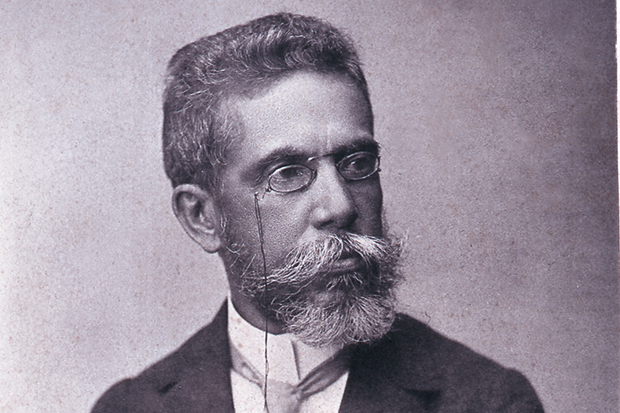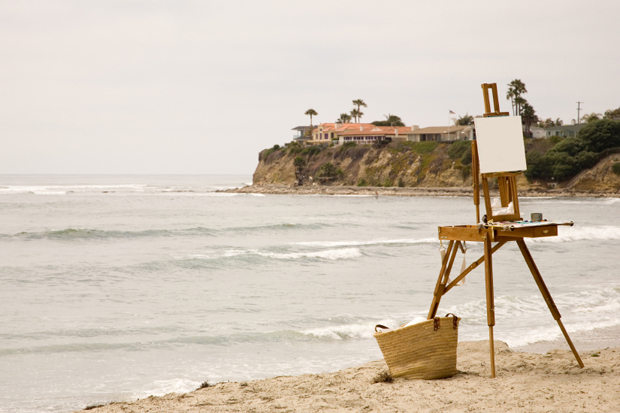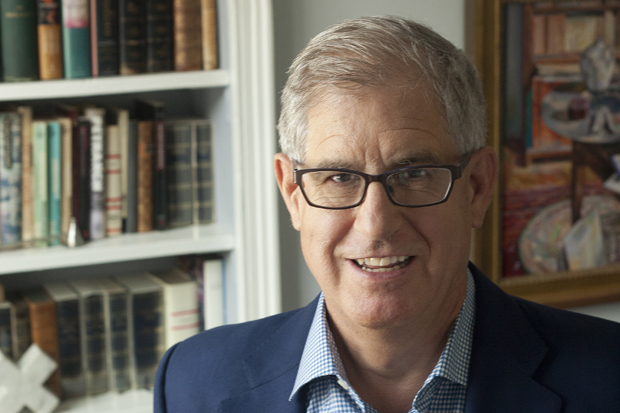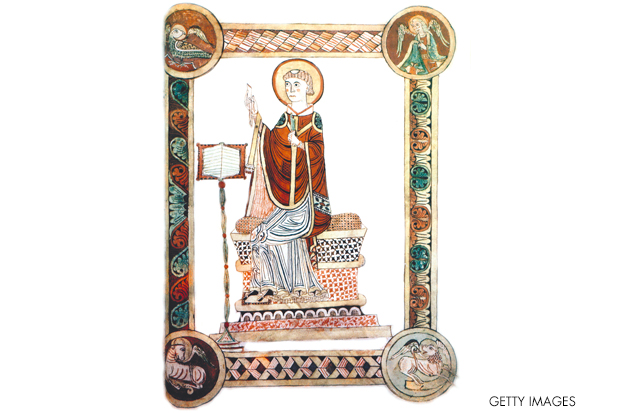The surname is pronounced ‘M’shahdo j’Asseece’. There are also two Christian names — Joaquim Maria — which are usually dispensed with. K. David Jackson, professor of Portuguese at Yale, confines himself to ‘Machado’ and has invented an adjective ‘Machadean’. Stefan Zweig, who committed suicide in the very Machadean town of Petropolis, called him ‘the Dickens of Brazil’ which is not true — he has not Dickens’s range or sustained ebullience. I used to say he was the Gogol of Brazil — particularly in his short stories — but re-reading Dom Casmurro, one of the five novels of Machado’s maturity, I can see he has not Gogol’s hatred, which gives the Ukrainian’s work such devastating comedic glitter.
Professor Jackson makes a very high claim at the outset — and carries on repeating it in a tone bordering on hysteria — that Machado is ‘arguably the major literary figure of all time in Latin American literature’. He was born in Rio in 1839, lived all his life in the city, and died there in 1908. His world is that of Emperor Pedro II, roughly 1840 to 1890. Another of Jackson’s favourite adjectives to describe Machado’s writing is ‘baroque’. But it would be more sensible to tame this extravagance to something like ‘rococo’: Machado’s world is smaller than Jackson would have it. His scenes could never be in London, Paris, Vienna or Rome; but they could easily be in Lisbon, Marseilles, Naples or Palermo with hardly a word altered. The only alert to a different milieu altogether is the casual use of the word ‘slave’.
What is absent is Brazil. In its place Machado packs his work with references to the greats of western literature. In Dom Casmurro there are pop-ups from Homer, Lucian, Plutarch, Dante, Camoes, Shakespeare and more. Thus he is reminding us at every opportunity that though he be writing at the periphery of civilisation he is very much connected to its core. To this end the jungle, the prairie, the Pantanal, the Amazon are never to be mentioned. We are confined to the sitting-room, the shop, the office, the church. The single most remarkable fact about Rio de Janeiro — its stunning physical location — is ignored. You’d hardly even know we were on the coast; the ocean makes one murderous intrusion into Dom Casmurro and that’s it. Paradoxically it is Machado’s inability to be fully where he is which betrays him. In seeking to affirm his centrality, he confirms his provinciality. In this sense
Patrick White, writing out of Sydney, is not a provincial writer.
Machado is also considered a premodernist, thanks to his capricious and engaging ironies, his playfulness with form, and frequent addresses to the reader or to the process of writing itself. But these features can also occur in the grand tradition of comic writing, in which the sentimental world is forever gravitating towards the horrible. Where has one encountered something of the Machadean savour before? In the Satyricon of Petronius and the Golden Ass of Apuleius, in Don Quixote of Cervantes, in Sterne’s Tristram Shandy, in Diderot’s Jacques le Fataliste, in pages of Rabelais, Fielding and Smollett. In other words, many aspects of modernism or postmodernism are not so very new.
Dom Casmurro is a domestic tragedy: an old man looks back on his youth with the weary detachment of one who accepts that it was a sick joke and he was cheated. All Machado’s important novels have this premise. Why, therefore, should we read five of them instead of one? Because there is something irresistibly delightful about how he puts his tragic universe across. Within his limits, his ability to tickle the reader is inexhaustible.
Here is something from Dom Casmurro to give you an idea:
A coconut palm that saw me perturbed and divined the cause murmured from the top of its crown that it was not unseemly for boys of 15 to get into corners with girls of 14; on the contrary, adolescents of that age had no other occupation, nor corners any other use.
The faux naïf tone and touch of surrealism are very characteristic, the reference to something like a palm tree very rare.
Prior to Daunt’s reissued translation by Helen Caldwell, I had the Peter Owen/Penguin one by Robert Scott-Buccleuch. She uses ‘coloured man’ or ‘negro’; he uses ‘black’. She uses ‘settee’ and ‘front room’; he uses ‘sofa’ and ‘drawing room’. Take your pick. In the end we aren’t quite sure whether Dom Casmurro was cheated or not. Is that postmodernist ambivalence, or was it ever thus in the Latin world?
Professor Jackson’s book is subtitled ‘A Literary Life’. There is virtually nothing of Machado’s life in it, not even the briefest biographical summary. The man is entirely hidden from us. As a work of literary criticism it struck me as not the work of a mind but of a machine. Most of the text is direct quotation or paraphrase of Machado’s content. The residue of analysis is absurdly overblown, relating Machado to every major writer in the western world but never telling us what makes him unique. Jackson’s method repeats a few simple ideas dressed up in abstract lists. The following is typical: ‘Machado relied on a rhetoric of substitution, employed through the figures of metonymy, synecdoche, metalypsis and syllepsis to formalise dissimulation, substitution, deception and displacement.’
I have nothing against erudite terminology; but when it is used so coarsely, and to disguise lack of penetration, the effect is of a kind of cretinism. If this is how literature is taught at Yale, something has gone terribly wrong there.
Got something to add? Join the discussion and comment below.
Get 10 issues for just $10
Subscribe to The Spectator Australia today for the next 10 magazine issues, plus full online access, for just $10.
'Dom Casmurro', £9.49 and 'Machado de Assis', £21 are available from the Spectator Bookshop, Tel: 08430 600033
You might disagree with half of it, but you’ll enjoy reading all of it. Try your first month for free, then just $2 a week for the remainder of your first year.














Comments
Don't miss out
Join the conversation with other Spectator Australia readers. Subscribe to leave a comment.
SUBSCRIBEAlready a subscriber? Log in